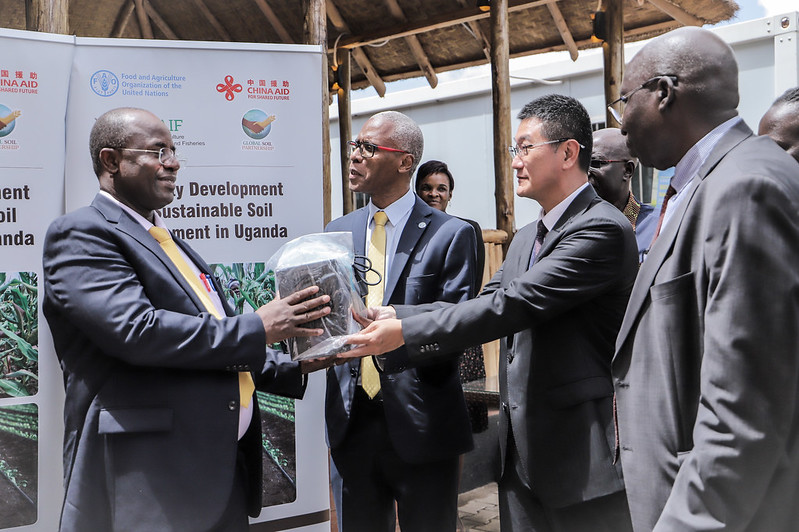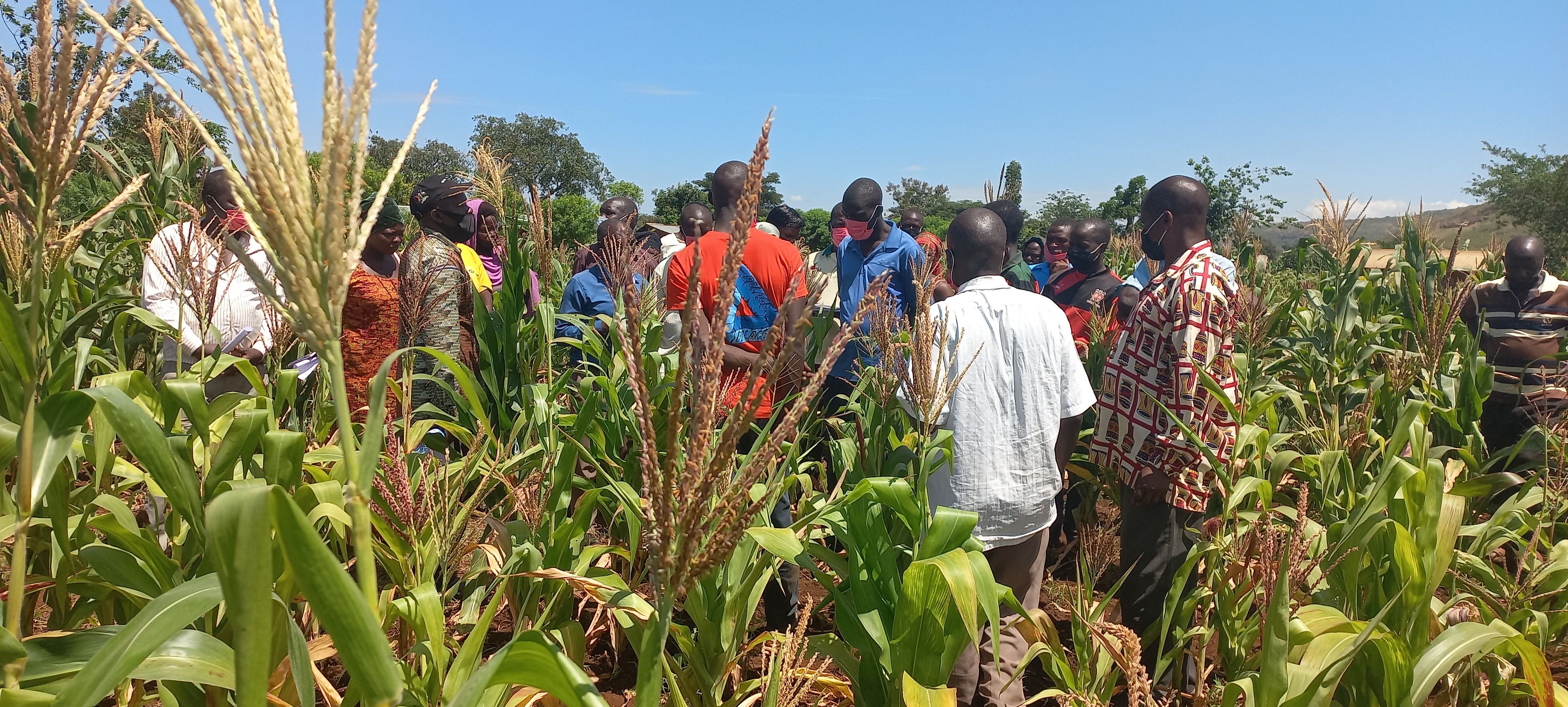Innovative strategies for addressing the dual challenges of covid-19 and fertilizer crisis in Ugandan agriculture through capacity development on sustainable soil management.
Agriculture plays a critical role in Uganda, where the majority of the population depends on it for their livelihoods. However, unsustainable soil management practices, exacerbated by the COVID-19 pandemic and fertilizer crisis, have led to soil degradation and declining crop production.

To address this urgent issue, the project ‘Capacity Development on Sustainable Soil Management for Uganda under the South-South Cooperation Mechanism’ was implemented from July 2020 to April 2023 with a budget of USD 500 000. With financial support from the People's Republic of China through the China International Center for Economic and Technical Exchanges (CICETE) and the China International Development Cooperation Agency (CIDCA), the FAO Representation in Uganda, Ministry of Agriculture Animal Industry and fisheries (MAAIF) and the Land and Water Division, through its Global Soil Partnership (GSP), were responsible for the implementation of the project. The South-South and Triangular Cooperation Division (PST) of FAO also played a key role in its coordination. Project partners consisted of the Institute of Agricultural Resources and Regional Planning (IARRP) at the Chinese Academy of Agricultural Sciences (CAAS), college of Agricultural and Environmental sciences (CAES) at Makerere University, Busitema University, National Agriculture Research Laboratories (NARL), and National Semi Arid Resources Research Institute (NaSARRI).

The project was carried out within the framework of the GSP tools and networks, including its Global Soil Laboratory Network (GLOSOLAN), the EduSOILS online education platform, and the International Code of Conduct for the Sustainable Use and Management of Fertilizers. The project has been fully implemented and reached all its objectives.
Soil nutrient analysis was conducted to assess the status of soil, and fertilizer recommendations were provided based on soil testing results, crop nutrient requests, and target yields. Chinese and Ugandan technical experts provided guidance in soil fertilizer testing and demonstrations. An innovative database of soil and fertilizer information was established, and trainings on sustainable soil management were organized to provide technical support for soil fertility evaluation and agricultural productivity improvement. (Photo on the right: Total N soil property map for the districts Kumi, Bulambuli and Namutumba, using a digital soil mapping approach based on the global soil nutrient and nutrient budget map GSNmap - FAO. 2022)
 The project achieved remarkable results, including the delivery of 12 items of equipment to a Ugandan soil laboratory, which significantly improved the country's soil testing capacity. A total of 500 soil and 100 fertilizer samples were collected and analyzed, and the promotion of soil and fertilizer databases now eases the access to critical information for the Ugandan farmers. Field trials were conducted in farmer fields to showcase soil testing and fertilizer application technologies, and training sessions were organized to share knowledge with 387 farmers. Furthermore, FAO and its partners developed three online soil education courses, which innovatively improved the soil knowledge and sustainable management capacity of 604 Ugandan researchers, extensionists, academia, private sectors, and officials. (Photo on the left: Handover ceremony of soil laboratory equipment ©FAO/Agatha Ayebazibwe)
The project achieved remarkable results, including the delivery of 12 items of equipment to a Ugandan soil laboratory, which significantly improved the country's soil testing capacity. A total of 500 soil and 100 fertilizer samples were collected and analyzed, and the promotion of soil and fertilizer databases now eases the access to critical information for the Ugandan farmers. Field trials were conducted in farmer fields to showcase soil testing and fertilizer application technologies, and training sessions were organized to share knowledge with 387 farmers. Furthermore, FAO and its partners developed three online soil education courses, which innovatively improved the soil knowledge and sustainable management capacity of 604 Ugandan researchers, extensionists, academia, private sectors, and officials. (Photo on the left: Handover ceremony of soil laboratory equipment ©FAO/Agatha Ayebazibwe)
The completion of the project had a significant positive impact on Uganda's soil management practices. It improved the country's capacity for soil testing and analysis, which in turn now contributes to better decision-making on fertilizer application and crop management. The project also increased awareness among farmers and other stakeholders about the importance of sustainable soil management, including the use of appropriate fertilizers, and the need to protect soil fertility for long-term agricultural productivity. Furthermore, the solution-orientated approach to addressing the challenges of the COVID-19 pandemic provides an outstanding example of successful project implementation in the field, which could be scaled up to other countries in the region.
 The success of the project reflects not only effective South-South cooperation between FAO, China, and Uganda, but also aligns with the UN Sustainable Development Goals (SDGs) and FAO’s "four betters" - better production, better nutrition, a better environment, and a better life, leaving no one behind. Strengthening sustainable soil management is crucial for achieving these goals and ensuring food security, livelihoods, and environmental sustainability in Uganda and beyond. (Photo on the right: Harvesting at a fertilizer demonstration site in Kumi District ©FAO/ Moses Isairyie).
The success of the project reflects not only effective South-South cooperation between FAO, China, and Uganda, but also aligns with the UN Sustainable Development Goals (SDGs) and FAO’s "four betters" - better production, better nutrition, a better environment, and a better life, leaving no one behind. Strengthening sustainable soil management is crucial for achieving these goals and ensuring food security, livelihoods, and environmental sustainability in Uganda and beyond. (Photo on the right: Harvesting at a fertilizer demonstration site in Kumi District ©FAO/ Moses Isairyie).
This project has also benefitted from the South-South Cooperation Assistance Fund, which indicates FAO’s strong capacity in utilizing its funds to implement challenging projects.
Echoing FAO Director-General’s words, this project on soil management will be an excellent basis and project model for FAO to further develop key projects with partners, such as CIDCA and CICETE.
In conclusion, the project ‘Capacity Development on Sustainable Soil Management for Uganda’ has been a resounding success in addressing the challenges of the COVID-19 pandemic and fertilizer crisis. Through soil testing, fertilizer recommendations, demonstrations, database establishment, and education and training, the project has improved Uganda's capacity for sustainable soil management and raised awareness among farmers and other stakeholders. It is a shining example of effective cooperation among international organizations and countries, and a step towards achieving the SDGs and the "four betters". Sustainable soil management is critical for the future of agriculture and food security, and the project’s results can serve as a model for other countries to follow in safeguarding their soils for generations to come.
